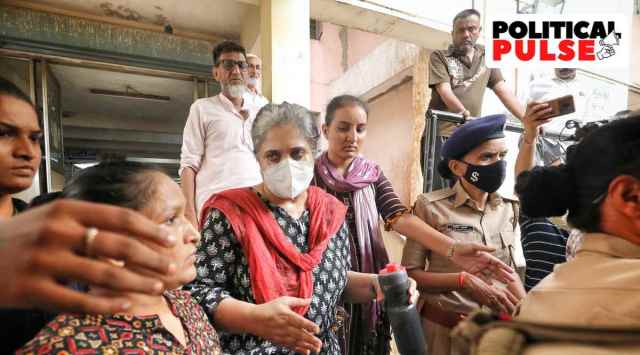The first to take up Gujarat riot cases, Teesta Setalvad faces arrest again
Arrest over charges of “fabricating evidence” in relation to 2002 riots; this is one of several cases that the activist is fighting in Gujarat courts
 Activist Teesta Setalvad outside Gheekanta metropolitan court last year. (Express photo by Nirmal Harindran)
Activist Teesta Setalvad outside Gheekanta metropolitan court last year. (Express photo by Nirmal Harindran) Just over a year after the Gujarat Police arrested activist Teesta Setalvad over charges of fabricating evidence linked to the 2002 Gujarat riots, she might be facing jail again.
On Saturday, the Gujarat High Court directed Setalvad to “surrender immediately”, rejecting her regular bail application. She was protected from arrest so far by way of the interim bail that had been granted to her by the Supreme Court in September 2022, following her first arrest.
The plea by Setalvad’s advocate to the High Court to stay the operation of the order for 30 days was rejected.
Setalvad’s arrest on June 25, 2022, along with co-accused former IPS officer R B Sreekumar, had come just a day after the Supreme Court dismissed a plea against the clean chit to then Chief Minister Narendra Modi and others over allegations of conspiracy in the riots.
The Supreme Court said the proceedings were pursued by the applicant – Zakia Jafri, whose husband Ehsan Jafri was killed in the riots — to “keep the pot boiling, obviously, for ulterior design” and said “all those involved in such abuse of process, need to be in the dock”.
The chargesheet accuses Setalvad of trying to “implicate” Narendra Modi, BJP leaders and state government officials by hatching “a conspiracy” to institute a “false case with false evidence”.
A journalist and activist based out of Mumbai and a Padma Shri, Setalvad, 61, is a founding trustee and secretary of the NGO Citizens for Justice and Peace (CJP) established in 2002 in the aftermath of the Gujarat riots, with one area of work being providing legal assistance to victims of the riots.
She was among the first activists to take up cases of the riot victims, which eventually led to the Supreme Court setting up a Special Investigation Team to probe the violence, six years later.
A source close to her says Setalvad was already involved with human rights through her Mumbai-based NGO Sabrang Trust when the Gujarat riots took place. “She came to Gujarat, spoke to the victims and decided to pursue their cases.”
Almost immediately, Setalvad found herself facing counter-cases. In 2006, charges of hurting religious feelings, fabricating false evidence, trespassing on burial places, among others , were slapped against Setalvad, her associate Raees Khan and 10 others by the Panchmahals police for allegedly carrying out unauthorised digging at a spot where bodies of 28 Muslim riot victims from Pandervada village had been buried by the administration.
A petition by Setalvad to quash this FIR remains pending before the Gujarat HC.
In March 2007, Setalvad took on then CM Modi head on for the first time, when in a special criminal application before the HC, she appeared as a co-petitioner with Zakia Jafri. The petition sought an FIR against Modi and 61 other politicians, bureaucrats and police officers for their alleged role in the 2002 riots, as well as a CBI inquiry against Modi.
The petition and Setalvad’s locus standi in the case were rejected, but she moved the apex court, which asked the SIT to conduct a preliminary inquiry into the allegations. The SIT was to give Modi a clean chit in this probe. The Supreme Court rap for Setalvad and others on June 2022 flowed from a petition challenging this clean chit.
As the riot cases proceeded in Gujarat, Setalvad also found herself facing allegations of tutoring witnesses, after Raees Khan, formerly a CJP member and one of its field workers in Ahmedabad, had a falling out with her.
In 2016, some victims of the Gulberg Society riots case, in which Ehsan Jafri was among those killed, accused Setalvad, her husband Javed Anand and Jafri’s son Tanveer of criminal breach of trust, cheating, criminal conspiracy etc. They alleged that foreign donations received for establishment of a museum at Gulberg Society were used for other purposes, including Setalvad’s personal use. Bank accounts of Sabrang NGO were frozen subsequently.
In 2018, an FIR was lodged at the Ahmedabad DCB Police Station against Setalvad and her husband, based on a complaint by Raees, accusing them of misappropriation of grants collected for their Sabrang NGO, for personal use. A petition moved by Setalvad and Anand to quash the same remains pending before the Gujarat HC.
Apart from Gulberg Society, Setalvad took up cases of the Naroda Patiya, Naroda Gam, Sardarpura, Dipda Darwaja, Ode and Best Bakery riot victims.
Setalvad comes from a family of legal luminaries. Her grandfather was M C Setalvad, India’s first Attorney General, while her great grandfather Chimanlal Harilal Setalvad was one of the three Indian members in the Hunter Commission that investigated the Jallianwalla Bagh massacre.
The daughter of a lawyer, she began her career as a journalist in Mumbai. In 1993, she launched a monthly magazine, Communalism Combat, along with Anand, as well as set up Sabrang seeking to provide “information and analysis on communal politics in India”.
Photos


- 01
- 02
- 03
- 04
- 05





























